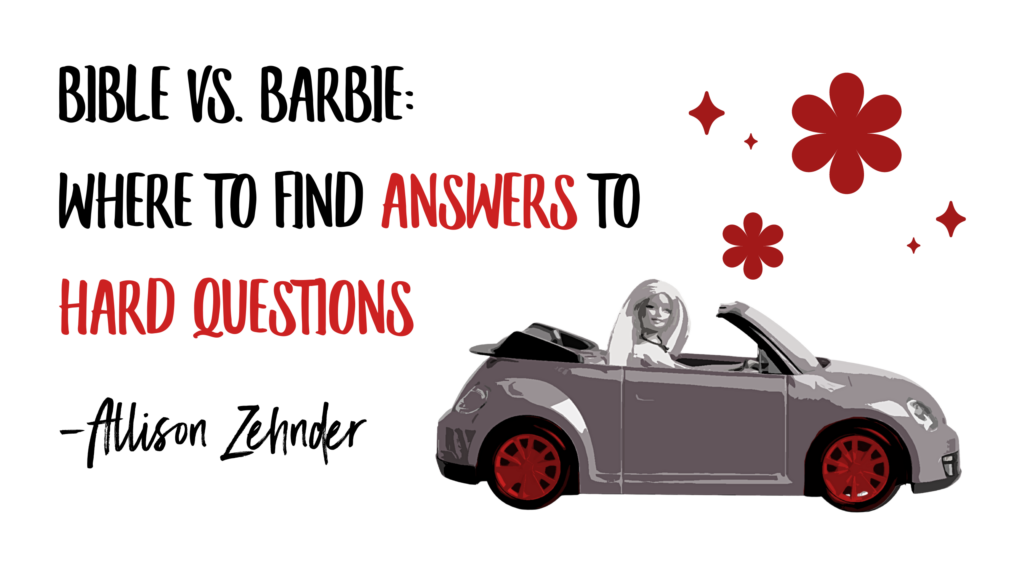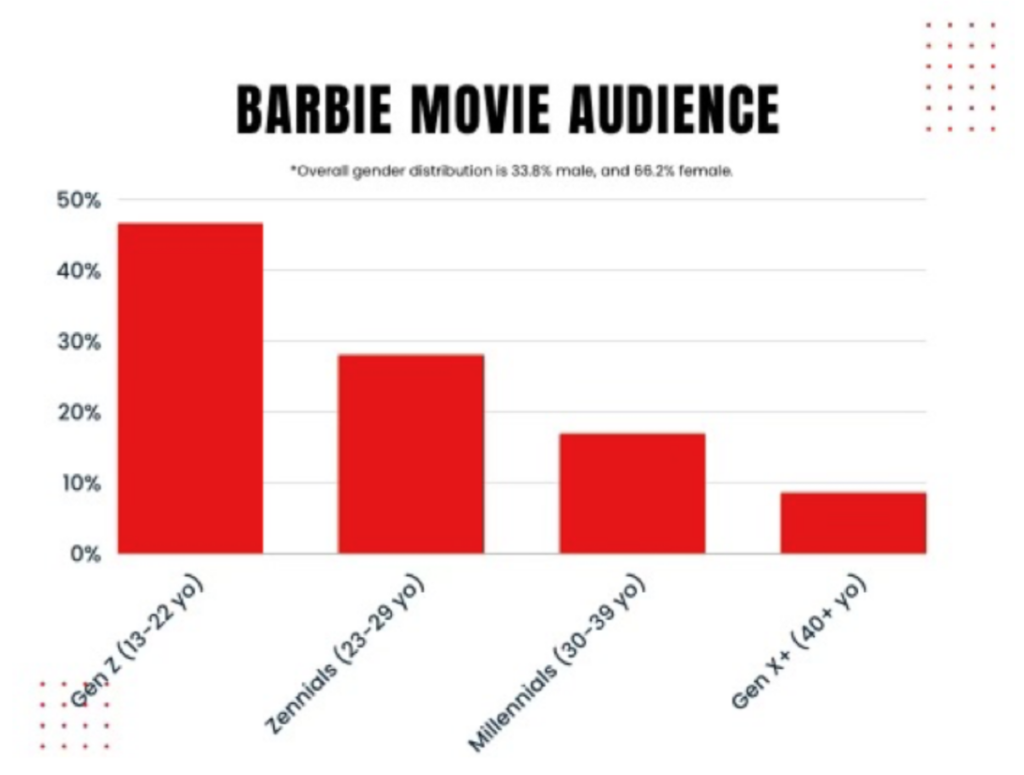

The summer has turned pink.
Barbie, written and directed by Greta Gerwig, has captured the nation this summer. After I began to wonder if going to the movie theater would be lumped into the same category of long-lost nostalgic memory as Blockbuster video, Barbie has broken multiple box office records and people are talking about it. There have been nearly 7 million social media posts about Barbie this year, translating to hundreds of millions of post views. You don’t have to see it to know what I am talking about. It’s hard to escape it. Even if you haven’t (and won’t) seen it, you know people who have, especially if you are under 40. In fact, the most prominent demographic is Gen Z.

So far, 47% of those seeing the movie are between 13 and 22 years old. Even with a PG-13 rating, many are even younger than that. Of that, 66% are female. Statistics show that many Christian parents are going with their kids to see Barbie.
Barbie brings up important conversations. It asks questions that should be discussed as a family. And like good Christians should do when confronted with tricky questions, parents are rushing to their Bible or Bible app and doing a keyword search on things like beauty, women’s roles, marriage, parenting, and men’s roles. Here is where I get concerned. If this is how you search for truth, you will not find it.
The reason is, the Bible doesn’t have a lovely verse you can share on Instagram that will detail everything we need to understand about God’s design for gender roles, identity, and feminism. At best, you will be left scratching your head in confusion at the verses that do show up. At worst, you will feel that Biblical teachings are outdated, irrelevant, or flat-out wrong about our modern issues. That doesn’t mean the truth is not there.
But you will find the wrong answers if you ask the wrong questions.
It won’t be the first time.
In the 1800s, church-going, faithful Christian people in the United States got very confused on an issue we have no problem answering now as a nation. Part of the problem was that they were asking the wrong question.
Christians were asking, “What verses in the Bible say slavery is bad?” Pastors couldn’t pinpoint an exact, clear, definitive verse about slavery. They looked for a specific message that spelled out precisely what people should do about slavery, and they couldn’t find any. Things went from bad to worse quickly because people wanted a black-and-white statement that was so clear, no one could misinterpret it. But they only looked at particular verses instead of the Biblical message as a whole. No one found the wording that fit their liking.
Make no mistake, it is the clear message of the Bible that all people should be treated with value and respect. But because some verses detailed how to treat slaves, many pastors even made a case FOR slavery based on those verses. As a nation, we are still recovering from that confusion. The problem all started with the wrong question. When we face complicated situations, let’s ask the right questions.
Rather than asking, “What verses in the Bible say slavery is bad?” a better question would have been, “What does the Bible teach about full humanity of all people, regardless of race?” When we stop reading the Bible as a whole and cannot understand its overarching message, we will miss the answers we so desperately seek. We can’t blame Barbie for presenting Mattel’s version of female empowerment. Barbie is just asking questions.
I’m right there with you in this confusion. I want to open the Bible and have it detailed out (preferably in bullet points) precisely what it means for me to be a woman. What is expected of me, what career I should be doing, how I divide up responsibility with my spouse, an exact budget for me to follow, and how I parent my kids. Oh, and by the way, I also want it to be a five to ten-minute read I can do with my coffee in my PJs before I go on to something else.
But my life is not a five-minute read, and neither is yours. The story of humanity on Earth and the Savior of that world is a life-long study. It needs to be taken seriously because, like it or not, we have been put here on this Earth with billions of other human beings, and God doesn’t want to keep us in a little pink bubble. (No pun intended!)
I’m not advocating for seeing or not seeing a movie. I am advocating for humble Christian engagement in a culture that’s desperate for answers. We ought to interact with the world: enjoy it, improve it, build cities, and help each other. God made that mandate clear to Adam and Eve; He continued to make it clear throughout the Old Testament. He loves this world so much that He came down and lived among us and then reinforced it when He sent us out into the world. The picture of heaven in Revelation is a city! And guess what is in cities??? People!
Our culture is crying out for answers. It asks good, challenging questions, and Christians fail to answer them well. But they are all right there, in the Bible. We need to ask the right questions to get a foundation to stand on. I like to start with this: What does the Bible teach about the full humanity of all people?
Here is what I found.
We can be upset at brokenness. When problems like generational trauma get passed down, crises upset our world, and suffering goes ignored, we can be justifiably upset. God makes it OK for us to cry “No!” to the crappy stuff in our lives because we know how things ought to be.
The reason that many Christians in the 1800s got off the rails concerning slavery was that they weren’t looking at the message of the entire Bible FIRST. When we start asking specific questions regarding what people should and shouldn’t do without considering the Bible’s message, we will get just as divided and lost as the churches of the Civil War.
The overarching message of the Bible is that God made things right, but everything went terribly wrong. Jesus came and set it right again. Sin is a debt that was paid for by Jesus. You are freely forgiven because of that. There is nothing else you can do to earn that salvation.
Our response is to love people by supporting the marginalized and offering biblical truth for those who are struggling. I will do what I can to show every person that they are worthy human beings and have essential roles to play.
Maybe you aren’t going to dress up in pink and grab your popcorn. Fine! Or perhaps you grew up playing with Barbies and bought advanced tickets to relive your childhood. Either way, you don’t need a movie to tell you that things have changed in our world. People are wrestling with some big questions. Director Greta Gerwig references Adam and Eve in the Garden of Eden as a comparison to Barbie and Ken. I can’t help but think that if she’s searching the Bible for truth, is anyone there to explain it to her? Our culture is asking some challenging questions. Are we, as a church, ready to answer them?
